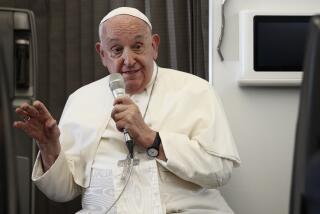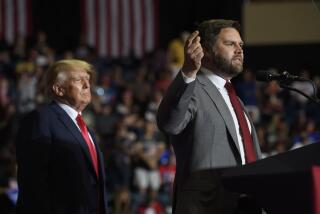Bishops take stand on faith and politics
- Share via
BALTIMORE -- — Catholic voters who back candidates because of their support for abortion or other “assaults on human life” would be “guilty of formal cooperation in grave evil,” according to a statement adopted Wednesday by U.S. Catholic bishops.
The bishops defined what they called “threats to the sanctity and dignity of human life” as human cloning, embryonic stem cell research, racism, torture and genocide.
In the midst of the 2008 presidential campaign season, the U.S. Conference of Catholic Bishops overwhelmingly endorsed an updated statement on faith and politics designed to help Catholics fulfill their political responsibilities to vote and run for office.
“It is not a voter guide,” said Bishop Nicholas DiMarzio of Brooklyn, N.Y., who presented a final version of the statement before the conference here. “It calls us as bishops to help form consciences for political life, not tell people how to vote or whom to vote for or against.”
The statement, titled “Forming Consciences for Faithful Citizenship: A Call to Political Responsibility,” outlined the bishops’ consensus on various topics, such as opposition to same-sex marriage and the death penalty, while providing a “consistent moral framework” for assessing political platforms.
“A Catholic cannot vote for a candidate who takes a position in favor of an intrinsic evil, such as abortion or racism, if the voter’s intent is to support that position,” said the text. “In such cases, a Catholic would be guilty of formal cooperation in grave evil.”
The bishops acknowledged there may be times when Catholics reject a candidate’s “unacceptable position” on one issue, but vote for the candidate anyway. The bishops said such a choice would “be permissible only for truly grave moral reasons, not to advance narrow interests or partisan preferences or to ignore a fundamental moral evil.”
“Unless we’re going to give up our right to vote . . . it may be that we never find the perfect candidate,” said Bishop Michael J. Sheridan of Colorado Springs, Colo. “So there’s where we have to try to decide which of the candidates do we think is at least going to propose and move toward the greatest good.”
The bishops’ statement went beyond earthly concerns, saying political choices “may affect the individuals’ salvation.”
“One of the responsibilities that I believe we have as bishops is to let our people know that the choices and the decisions that they make in their lives here on Earth do impact their salvation,” said Bishop Samuel J. Aquila of Fargo, N.D. “And we as bishops are really called to be about the salvation of souls, eternal life, and for Catholics who choose to support intrinsic evils . . . they may be putting their salvation at risk.”
Bishops said the reference to salvation is meant not to cast judgment on individuals but make them aware of the possible effects of their choices.
Sheridan said he suggests Catholics at odds with the Church’s positions seek clerical counsel. But he said if Catholic candidates or voters whose views on social issues continued to clash publicly and obstinately with those of the church, he would encourage them to refrain from receiving Communion, one of the Church’s most holy sacraments.
When those individuals receive the sacrament, Sheridan said, other believers might mistakenly interpret their views as being validated by the church.
In 2004, several bishops said Sen. John F. Kerry (D-Mass.), a Catholic and then-presidential candidate, should be barred from receiving the sacrament because he supported abortion rights. The bishops voted at their 2004 conference to leave such decisions up to local clergy.
The bishops also addressed Iraq, calling for a “responsible transition” that ends the war with a minimal loss of human life.
The text of the statement is available at www.usccb.org.
--
More to Read
Get the L.A. Times Politics newsletter
Deeply reported insights into legislation, politics and policy from Sacramento, Washington and beyond. In your inbox twice per week.
You may occasionally receive promotional content from the Los Angeles Times.










